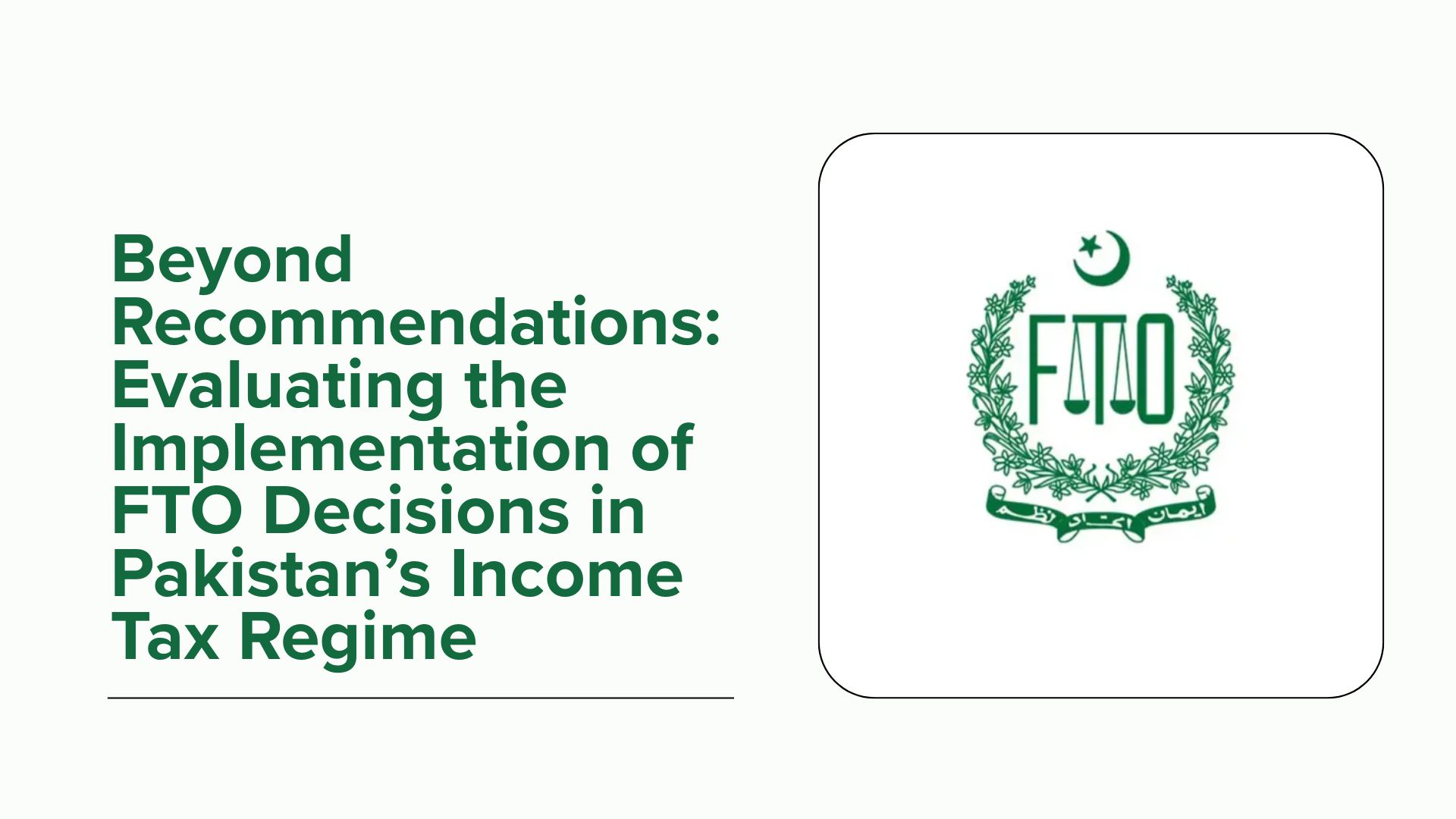Introduction: -
With the recent approval of the 2025–26 federal budget, the Federal Board of Revenue (FBR) has been granted significantly expanded powers. These include the authority to conduct arrests, freeze accounts, carry out raids, initiate extended audits, and impose steep penalties, often at the department's discretion. In this context, the role of the Federal Tax Ombudsman (FTO) as an independent watchdog becomes more critical than ever, not just in issuing recommendations, but in ensuring their actual implementation. This article examines the legal and administrative complexities surrounding implementation, evaluates real-world outcomes, and suggests ways to bridge the gap between recommendation and relief.
Legal Status of FTO Recommendations: -
Under Section 11 of the Federal Tax Ombudsman Ordinance, 2000, the FTO is empowered to communicate findings along with recommendations to the concerned department, giving it a specific period to either comply or provide reasons for non-compliance. If the FTO believes that an injustice has occurred which cannot be remedied through ordinary means, a special report may be laid before the President of Pakistan. Moreover, if a department or official fails to comply without justification, it constitutes Defiance of Recommendations under Section 11(5). While outright refusals are rare, delays in implementation are common. Departments often exceed the prescribed 45-day period; however, recommendations are generally complied with eventually.
The implementation process, particularly after the Ombudsmen Reforms of 2013, has been designed to be both efficient and accountable. Each FTO regional office appoints a dedicated implementation officer responsible for monitoring compliance. No complaint is marked as closed until full compliance is confirmed. This structured follow-up has enabled the FTO to translate legal findings into tangible taxpayer relief. For instance, in Almoiz Industries Limited, a refund of over Rs. 148 million was processed after FTO intervention. In Waqas Steel Furnace and Crescent Cotton Mills, the FTO’s involvement overcame procedural delays, resulting in full or partial refund issuance. Even in complex scenarios involving jurisdictional confusion or legal objections, such as in S.M. Food Makers Ltd. and Vision Foods, the FTO upheld taxpayers’ rights to timely resolution. These outcomes confirm that the FTO’s implementation mechanism is more than procedural; it is a vital accountability tool that restores public trust in the tax system.
However, despite a well-defined structure, recurring bottlenecks hinder smooth implementation. One common issue is the use of administrative justifications to excuse delays. In Hamid Pervaiz (5817/LHR/IT/2025), the FBR cited a First-In-First-Out (FIFO) policy based on an internal circular to deny any delay in refund processing. The FTO rightly clarified that statutory rights cannot be restricted by internal administrative instructions. Similarly, in Saad Masood (11667/LHR/IT/2025), jurisdictional misalignment between the CTO and RTO offices resulted in significant delay, highlighting systemic inefficiencies in coordination within the FBR.
As discussed, most departments eventually comply with FTO recommendations. However, where they do not, Section 32 of the Ordinance allows either party to file a representation before the President of Pakistan within 30 days. In multiple past cases, the President has upheld the FTO’s orders and rejected departmental objections, especially where maladministration is distinct from appealable tax issues. This has proven to be an important deterrent to departmental non-compliance and reinforces the FTO’s capacity to deliver effective taxpayer relief.
While the FTO’s structured implementation process has shown results, certain institutional limitations remain. A significant constraint is that the FTO cannot review or reopen its own decisions. Unlike courts or tribunals, it lacks express statutory authority to recall or amend previously issued orders. If new evidence arises or an error is discovered post-decision, the complainant must either file a fresh complaint or seek presidential review, a lengthy and restricted process.
Another key limitation is the FTO’s inability to recommend financial relief or damages. For example, Section 171 of the Income Tax Ordinance, 2001 entitles taxpayers to additional compensation (KIBOR + 0.5%) for delayed refunds, after the issuance of an order. However, this provision is rarely enforced, and the FTO lacks the authority to compel such payments. In cases like 8091/LHR/IT/2025, where a CIR (A) issued an order in 2017, the complainant would have been entitled to a substantial compensatory amount. The absence of this relief mechanism limits the scope of justice and reduces the deterrent effect on FBR for causing unjustified delays.
Conclusion: -
As FBR continues to gain expanded power, the Federal Tax Ombudsmen’s role as an independent check on tax administration becomes more vital. The FTO has proven to be a credible institution, not only in identifying maladministration but in ensuring that corrective measures are implemented. Through structured follow-up mechanisms, regional implementation officers, and the support of the President’s office under section 32, the FTO has succeeded in converting legal findings into practical relief for taxpayers. However, certain structural limitation remains, the inability to review its own orders, lack of authority to recommend financial recommendations for delayed refunds and occasional jurisdictional ambiguity all hinder its broader potential. If these gaps are addressed through legislative reform, the FTO could serve as an even more effective watchdog, one that not only protects taxpayer rights but also strengthens institutional accountability within Pakistan’s evolving tax system.

